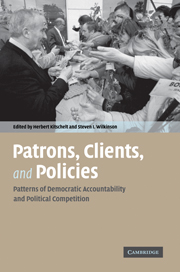Book contents
- Frontmatter
- Contents
- List of figures
- List of tables
- Acknowledgments
- List of contributors
- 1 Citizen–politician linkages: an introduction
- 2 Meet the new boss, same as the old boss? The evolution of political clientelism in Africa
- 3 Monopoly and monitoring: an approach to political clientelism
- 4 Counting heads: a theory of voter and elite behavior in patronage democracies
- 5 Explaining changing patterns of party–voter linkages in India
- 6 Politics in the middle: mediating relationships between the citizens and the state in rural North India
- 7 Rethinking economics and institutions: the voter's dilemma and democratic accountability
- 8 Clientelism and portfolio diversification: a model of electoral investment with applications to Mexico
- 9 From populism to clientelism? The transformation of labor-based party linkages in Latin America
- 10 Correlates of clientelism: political economy, politicized ethnicity, and post-communist transition
- 11 Political institutions and linkage strategies
- 12 Clientelism in Japan: the importance and limits of institutional explanations
- 13 The demise of clientelism in affluent capitalist democracies
- 14 A research agenda for the study of citizen–politician linkages and democratic accountability
- References
- Index
11 - Political institutions and linkage strategies
Published online by Cambridge University Press: 27 October 2009
- Frontmatter
- Contents
- List of figures
- List of tables
- Acknowledgments
- List of contributors
- 1 Citizen–politician linkages: an introduction
- 2 Meet the new boss, same as the old boss? The evolution of political clientelism in Africa
- 3 Monopoly and monitoring: an approach to political clientelism
- 4 Counting heads: a theory of voter and elite behavior in patronage democracies
- 5 Explaining changing patterns of party–voter linkages in India
- 6 Politics in the middle: mediating relationships between the citizens and the state in rural North India
- 7 Rethinking economics and institutions: the voter's dilemma and democratic accountability
- 8 Clientelism and portfolio diversification: a model of electoral investment with applications to Mexico
- 9 From populism to clientelism? The transformation of labor-based party linkages in Latin America
- 10 Correlates of clientelism: political economy, politicized ethnicity, and post-communist transition
- 11 Political institutions and linkage strategies
- 12 Clientelism in Japan: the importance and limits of institutional explanations
- 13 The demise of clientelism in affluent capitalist democracies
- 14 A research agenda for the study of citizen–politician linkages and democratic accountability
- References
- Index
Summary
Individual politicians and political parties can be linked to their (prospective) voters by various means (Lawson 1980; Müller 1989; Kitschelt 2000b). The three most commonly referred to in the literature, beginning with Max Weber (1976), are policy, clientelism, and charisma. As charisma is a rare gift and hardly any Western party nowadays builds exclusively or overwhelmingly on the charisma of its leader I will not address it here. It is sufficient to note that charisma can be combined with any of the other linkage strategies. Likewise, policy and clientelism can go together. Moreover, I take it that policy linkage nowadays is the rule in Western democracies. Although this is probably more true at the normative level – the self-presentation of the relevant actors – than empirically, electoral politics are mostly policy-driven even in the countries that are labeled “high in clientelism” below. If anything, clientelism is nowadays less important for tying voters to political parties than two decades or more ago. Hence, the chapter is interested in the question of which institutional features make it more or less likely that linkages based on policies are accompanied by clientelistic appeals (and potentially provide for clientelism as the main linkage mechanism).
This chapter employs the definition of clientelism used throughout the volume as particularistic and direct exchange between clients and politicians.
- Type
- Chapter
- Information
- Patrons, Clients and PoliciesPatterns of Democratic Accountability and Political Competition, pp. 251 - 275Publisher: Cambridge University PressPrint publication year: 2007
- 14
- Cited by



